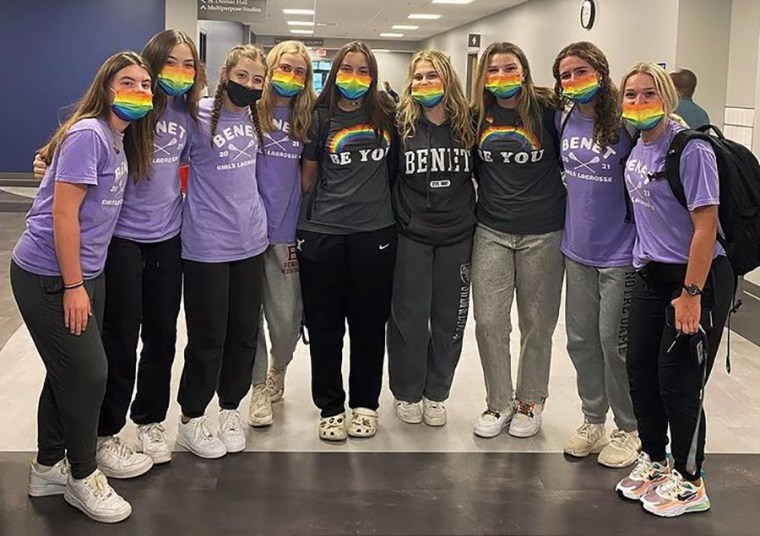After backlash, Illinois Catholic school reverses course, hires lesbian coach
Amanda Kammes was offered a position earlier this month as the head girls lacrosse coach at Benet Academy, a private Catholic high school in suburban Chicago.
A day later, after Kammes submitted paperwork listing her wife as her emergency contact, the offer of employment was rescinded, according to Kammes’ supporters.
The Lisle, Illinois, school justified its decision to “defer” Kammes’ offer at the time, referring to its mission as a Catholic institution.
“Benet Academy respects the dignity of all human beings to follow their conscience and to live lives of their choosing,” spokeswoman Jamie Moss said. “Likewise, as a Catholic school, we employ individuals whose lives manifest the essential teachings of the church in order to provide the education and faith formation of the young people entrusted to our care.”https://iframe.nbcnews.com/lJOVdr1?app=1
However, after a groundswell of support for Kammes, including a rally outside the school and a letter signed by more than 3,000 alumni and members of the community, Benet reversed its decision Monday.
“The Board of Directors of Benet Academy today announced that the Academy has extended an offer to Amanda Kammes to be the school’s next girls lacrosse head coach and she has accepted the offer,” Benet Academy’s board said in a statement emailed to NBC News. “The Board has heard from members of the Benet community on all sides of this issue over the past several days. We had an honest and heartfelt discussion on this very complex issue at our meeting. Going forward we will look for opportunities for dialogue in our community about how we remain true to our Catholic mission while meeting people where they are in their personal journey through life. For now, we hope that this is the first step in healing the Benet community.”

Kammes, who is also an alumna of the school, did not immediately respond to requests for comment.
Colleen Savell, the assistant varsity lacrosse coach at Benet Academy, said she’s “overjoyed” by the school’s decision to reverse course.
“I am so proud of the girls on the team and of their parents,” Savell said, referring to the girls lacrosse team. “They have really rallied around Amanda, and it’s been unbelievable. They have blown my mind.”
Savell added that she hopes school officials take steps to support LGBTQ students at Benet whose mental health and sense of well-being were affected by the school’s treatment of Kammes.

While this particular story has a happy ending for Kammes and her supporters, legal uncertainties continue to surround how much leeway religious institutions have when it comes to hiring and terminating LGBTQ employees — and experts say these disputes are unlikely to disappear soon.
“I think it’s going to percolate for a while,” Jenny Pizer, law and policy director for Lambda Legal, an LGBTQ civil rights organization, said.
In a landmark decision last year, the Supreme Court ruled thatLGBTQ employees are protected from discrimination under Title VII of the Civil Rights Act of 1964. However, there are important carve-outs for religious organizations like Catholic schools.
Recommended
ASIAN AMERICAAsian American lawmakers urge DOJ to give hate crimes law updates
OUT POP CULTUREElvira, ‘Mistress of the Dark,’ comes out in new memoir
Lynn Starkey, a guidance counselor of nearly 40 years at Roncalli High School in Indianapolis, was fired after school officials discovered she is married to a woman. She sued the city’s archdiocese, but last month a federal judge sided with the Catholic school, saying Starkey could be considered a “minister of faith” and is therefore subject to the “ministerial exception” in employment law that allows religious institutions tremendous discretion when it comes to hiring and firing.
The same archdiocese is being sued by Joshua Payne-Elliott, a teacher who said he was also fired for being gay. Payne-Elliot’s lawsuit was dismissed in May, but he is appealing the decision. In 2020, the Trump administration filed an amicus brief on behalf of the archdiocese.
Not all the news is bad for LGBTQ employees, as some courts have found the ministerial exception is limited in scope.
Earlier this month, a federal judge ruled in favor of gay substitute teacher Lonnie Billard, who announced on social media that he was marrying his partner. The judge found the school was not protected under Title VII exemptions because Billard did not give religious instruction.
The Supreme Court, which has the legal final word on questions regarding the ministerial exception, has demonstrated what Pizer called an “enthusiastic embrace” of religious liberty. The court has issued decisions about the ministerial exception in recent years, finding in favor of the religious schools.
Changing social attitudes, however, may send a clearer message than case law, according to Pizer.
“I think that there is a growing recognition among some of the faith-based institutions that they are increasingly out of step with the young people that they are inviting to be students and to get their education,” Pizer said. “Parents have a greater sense of confidence and urgency to push the institution to be consistent.”
“It’s lovely that in this situation the school decided to value the needs of the students,” she added.